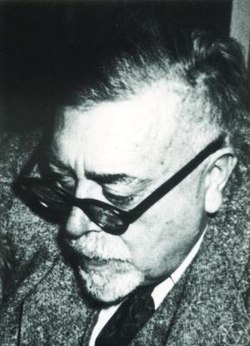The classical definition of probability or classical interpretation of probability is identified with the works of Jacob Bernoulli and Pierre-Simon Laplace:...
11 KB (1,457 words) - 04:10, 23 March 2025
the field of probability, championed by Pierre-Simon Laplace, is now known as the classical definition. Developed from studies of games of chance (such...
37 KB (4,316 words) - 04:04, 23 March 2025
space: see Classical definition of probability. For example, if the event is "occurrence of an even number when a dice is rolled", the probability is given...
26 KB (3,602 words) - 11:44, 23 April 2025
Quantum Markov chain (category Exotic probabilities)
reformulation of the ideas of a classical Markov chain, replacing the classical definitions of probability with quantum probability. Very roughly, the theory of a...
2 KB (201 words) - 17:45, 26 February 2025
Frequentist probability or frequentism is an interpretation of probability; it defines an event's probability (the long-run probability) as the limit of its relative...
24 KB (2,530 words) - 09:57, 10 April 2025
Gambling mathematics (redirect from Mathematics of gambling)
gambling probability applications. In games of chance, most of the gambling probability calculus in which we use the classical definition of probability reverts...
25 KB (4,466 words) - 12:00, 25 March 2025
Clark–Ocone theorem Class membership probabilities Classic data sets Classical definition of probability Classical test theory – psychometrics Classification...
87 KB (8,280 words) - 23:04, 12 March 2025
A definition is a statement of the meaning of a term (a word, phrase, or other set of symbols). Definitions can be classified into two large categories:...
31 KB (3,903 words) - 17:59, 14 October 2024
finite-dimensional. We first discuss the classical case. Suppose the probabilities of a finite sequence of events is given by the probability distribution P = {p1...pn}...
13 KB (2,421 words) - 01:44, 14 April 2025
Probability is a branch of mathematics and statistics concerning events and numerical descriptions of how likely they are to occur. The probability of...
39 KB (5,159 words) - 16:30, 1 May 2025
probability. As with the classical Shannon entropy and its quantum generalization, the von Neumann entropy, one can define a conditional version of min-entropy...
15 KB (2,716 words) - 23:06, 21 April 2025
In probability theory, a probability distribution is infinitely divisible if it can be expressed as the probability distribution of the sum of an arbitrary...
9 KB (1,056 words) - 20:03, 11 April 2024
quantum mechanics, a probability amplitude is a complex number used for describing the behaviour of systems. The square of the modulus of this quantity at...
27 KB (3,522 words) - 05:06, 24 February 2025
probability current (sometimes called probability flux) is a mathematical quantity describing the flow of probability. Specifically, if one thinks of...
20 KB (3,444 words) - 13:19, 15 April 2025
In probability theory, there exist several different notions of convergence of sequences of random variables, including convergence in probability, convergence...
41 KB (5,282 words) - 21:46, 11 February 2025
Noncrossing partition (category Families of sets)
a sum of free cumulants over the sum non-crossing partitions. This is the free analogue of the moment-cumulant formula in classical probability. See also...
5 KB (758 words) - 17:01, 28 August 2023
Phi (redirect from 21st letter of the Greek alphabet)
Modern Greek: φι fi [fi]) is the twenty-first letter of the Greek alphabet. In Archaic and Classical Greek (c. 9th to 4th century BC), it represented an...
14 KB (1,679 words) - 14:00, 18 April 2025
Bayes' theorem (redirect from Bayes' theorem of subjective probability)
known as the prior probability and marginal probability. Bayes' theorem may be derived from the definition of conditional probability: P ( A | B ) = P (...
49 KB (6,809 words) - 00:29, 26 April 2025
In probability theory and statistics, the characteristic function of any real-valued random variable completely defines its probability distribution. If...
38 KB (5,208 words) - 13:53, 16 April 2025
Free independence (category Free probability theory)
the mathematical theory of free probability, the notion of free independence was introduced by Dan Voiculescu. The definition of free independence is parallel...
4 KB (688 words) - 14:40, 27 October 2024
Entropy (statistical thermodynamics) (section Order through chaos and the second law of thermodynamics)
probability theory. The statistical entropy perspective was introduced in 1870 by Austrian physicist Ludwig Boltzmann, who established a new field of...
18 KB (2,621 words) - 19:57, 18 March 2025
Quantum mutual information (section Definition)
finite-dimensional. The definition of quantum mutual entropy is motivated by the classical case. For a probability distribution of two variables p(x, y)...
5 KB (1,053 words) - 14:46, 3 September 2024
Markov chain (redirect from Transition probability)
In probability theory and statistics, a Markov chain or Markov process is a stochastic process describing a sequence of possible events in which the probability...
96 KB (12,900 words) - 21:01, 27 April 2025
A prior probability distribution of an uncertain quantity, simply called the prior, is its assumed probability distribution before some evidence is taken...
43 KB (6,753 words) - 20:06, 15 April 2025
Entropy (information theory) (redirect from Entropy of a probability distribution)
measures the expected amount of information needed to describe the state of the variable, considering the distribution of probabilities across all potential states...
72 KB (10,210 words) - 18:29, 22 April 2025
microstate has a certain probability of occurring during the course of the system's thermal fluctuations. In contrast, the macrostate of a system refers to...
11 KB (1,621 words) - 02:02, 17 March 2025
Expected value (redirect from Linearity of expectation)
of the weighted average. Informally, the expected value is the mean of the possible values a random variable can take, weighted by the probability of...
52 KB (7,614 words) - 09:40, 1 May 2025
is a strictly positive probability measure. Given classical Wiener measure γ on C0, the product measure γ n × γ is a probability measure on C, where γ n...
8 KB (1,216 words) - 10:23, 6 April 2025
The probability of the outcome of an experiment is never negative, although a quasiprobability distribution allows a negative probability, or quasiprobability...
14 KB (1,744 words) - 06:24, 14 April 2025
Stochastic process (redirect from Version (probability theory))
In probability theory and related fields, a stochastic (/stəˈkæstɪk/) or random process is a mathematical object usually defined as a family of random...
168 KB (18,657 words) - 17:03, 16 March 2025












